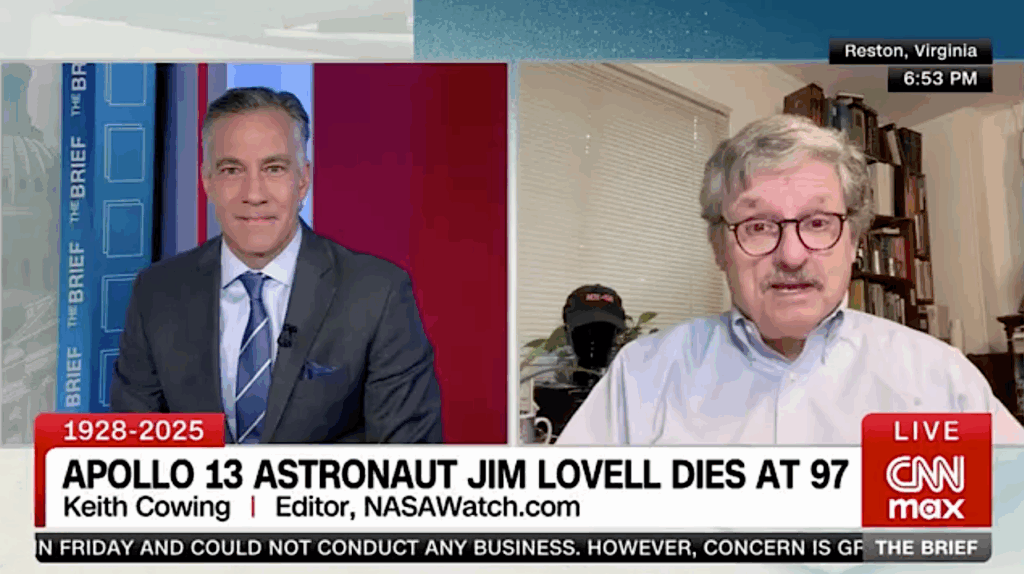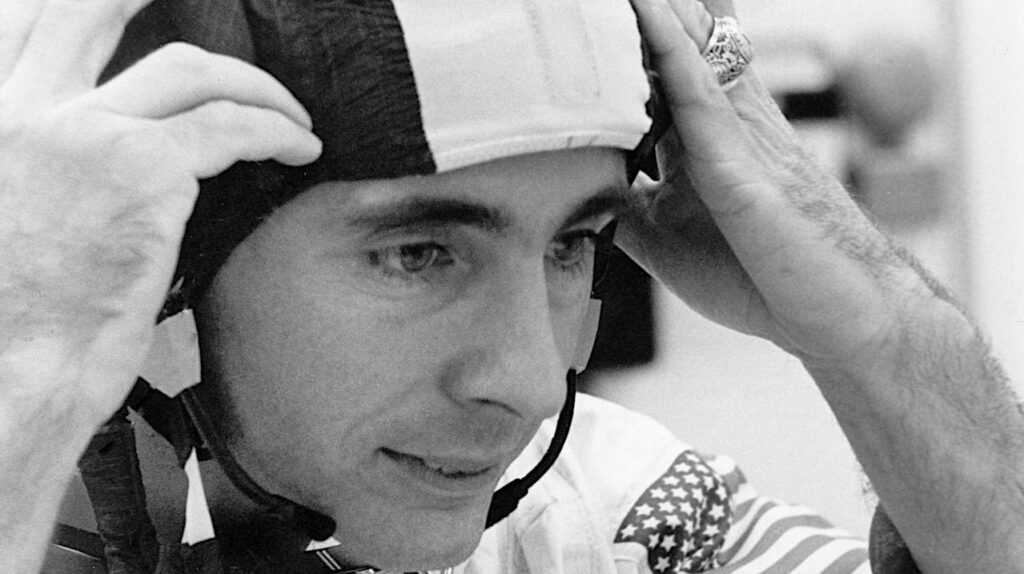Review: "The Last Man on The Moon"

The Last Man on The Moon Wants You To Go Back (Review), SpaceRef
“Nearly half a century ago we sent people on improbable voyages to another world – because we could. Indeed, for a while, such voyages became routine. Then, suddenly, it was over. We stopped visiting the Moon before we had barely figured out to do so. We knew that it might be a while before we went back, but we would go back – right?”









Damn, that’s said. I wonder what he knew at the time – after 1970, it was pretty clear that the program (and NASA) was going to be carved down significantly. All that capacity for heavy lift and lunar landings gone, after years and billions in development.
NASA proposed a continuing series of Apollo lunar missions but neither the President (Nixon) nor the Congress had any motivation to continue to spend the money required, and public support dropped dramatically after the first landing, a problem that many space enthusiasts today still ignore.
NASA fell back to what seemed a reasonable stance, the Shuttle would reduce cost and produce practical benefits. Unfortunately the decision to leap to a final design with no flying prototypes left NASA with a system that had operating costs 100 times the original goal.
We cannot afford nostalgia. Even today it would be a mistake to return humans to the Moon with a system so expensive that only a token handful could make the trip. The fundamental obstacle to human spaceflight is not gravity, but cost. The Shuttle was an attempt to solve that problem. It failed to do so. Our response should be to learn from experience and try again.
Unaccountably we instead have decided to deny that cost is a limiting factor and to return to the Apollo model, despite its obvious historical failure. Insanity is doing the same thing and expecting different results.
Indeed. Your comments could possibly be expanded: {NASA} has decided to ignore costs and has refused to turn to the private sector with enthusiasm.
Just where are the NASA Space Cadets? The one who see F9 and FH as an actual, real, and affordable path to the future?? Why isn’t the astronaut corp chafing like crazy? And what about the science geeks who disdaining HSF cry because they don’t have a Neptune or Uranus orbiter?
Why aren’t these folks speaking out? Their dreams are over in Hawthorne.
Your statement could be expanded further.
NASA has decided to ignore rational thinking or logically laid out strategies. Most space cadets have been silenced. They are trying to hang on to whats left of their jobs.
I’ve heard about hundreds of safety violations on Orion, but everyone is afraid of saying anything for fear of providing rationale for ending the program.
They were led down a strategic dead end 10 years ago by a narcissist who had no idea how to design a spacecraft, let alone what we would do with it if we had it. We’ve been on the road to Abilene for a decade.
Waiting for a FH to actually fly. Then for an upper stage which to get a useful orbiter to Neptune. Then for NASA to get less risk adverse about aerocapture (maybe optional with a FH and a good upper stage.) At the moment I hear lots of talk about planetary missions using SLS. I have real doubts about that, but somehow SLS is taken more seriously than FH, and probably will be until FH flies. (I think there is some faith among planetary scientists that NASA will deliver on what they plan to build, but a wait and see attitude towards the plans of a private company. I’m not waisting me time arguing to the contrary until I have a FH first flight to point to.)
Quite frankly, a lot of the NASA leadership had no motivation to continue Apollo after Apollo 17. They were concerned that Apollo had too few redundancies, and was too likely to leave astronauts stranded, ever-visible from earth as a permanent memorial to the human spaceflight program. So the current set of NASA gubers tried to restart Apollo (on steroids) in some kind of an effort to pick up where the experienced people left off.
Redundancy is not equivalent to reliability. This myth was born when the decision was made to leap directly to flight with the Saturn V through the newly coined magic of “systems engineering”. The Saturn worked, but it was intrinsically simple and we were also lucky. The prevalence of the illusion that safety can be achieved as long as a block diagram that can be understood by managers who have never torqued a bolt ot welded a seam shows there is no “single point failure” is a serious organizational flaw that plagues NASA even today.
The problem I am having with Discus is that the advertisements cover up the submit button.
I’m with you, Keith. I’m younger (53), but I remember my mother calling me into the house to watch the Moon landings.
We are the Moon Children. Together, we’ll work here and elsewhere to push for humanity’s return to the Moon and dirty red boots on Mars.
I was one of just three people who attended the Sunday night showing of LMOTM in DC, and I’m told by the theatre folks there the turnout wasn’t that great at other times, even when two shuttle era astronauts attended Saturday/Sunday screenings. As movies (or documentaries) go, this was a nice attempt to re-frame the story, but for me it fell short on pinpointing why Cernan was the last person on the surface. I wish the filmmaker would have taken a more factual stance on what has happened since 1972, but instead the focus was on the human cost. And while that’s fine, I walked away with an empty feeling instead of what I was really looking for; a reason for this generation of people to understand and care why going into space is important. I would have loved to have seen an explanation how through short sighted politics, we have essentially thrown almost all of our 70’s-borne American expertise and innovation away. The worst part was the propaganda at the end pumping SLS and Orion as the next step on the path to Mars. Neither is anything more than another Congressionally mandated disaster, just as the shuttle became a camel designed by NASA, the Air Force, and Congress. That led to the deaths of not only 14 astronauts but also the momentum of the world’s (then) greatest space program. And sadly, here we are now, watching grainy video of something from 44 years ago, wondering what happened.
It is unfortunate but I don’t think that, aside from some fond memories from our youth, there is a lot of support for a new Apollo. I doubt that most people under age 45 could tell you who Cernan was, or what Apollo accomplished, or why anyone would dream of going to the Moon or Mars (and besides most would probably say; we’ve been there, to the Moon and to Mars, and we did not find anything useful or valuable. Why do we need to go back? If there is a reason, I have not heard it.
You’re probably right that most people would not know who Cernan is, other than us Space Cadets. And you’re right that nobody’s going to support another Apollo; but that’s not what most people are talking about, either. But if we haven’t made a case for returning to the moon, then shame on us. Look around; the Chinese are preparing to land there. The Russians claimed to be on track to do so until their economy crashed (for a number of reasons). Many people believe there’s commercial value to the moon. But even if there isn’t, not one but two expert Commissions have explained in great detail how learning to live away from Earth is valuable for getting to Mars, especially since a return trip is just three days and any crises can be managed first and then learned from for future use.
Really want to see this. Hopefully the local theater will play it.
Hope is, perhaps, not the best tool here. I would check the film’s web site to see if your community is on the schedule. If it’s not, contact your local art house/documentary movie theater and ask them to run it. If you have a local group with an interest in this area, be it interest group, school, whatever, make the request on their behalf so that the theater knows there will be an audience for it.